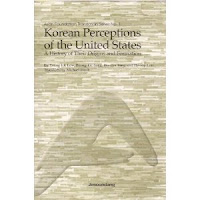Title: Korean Perceptions of the United States: A History of Their Origins and Formation
Author: Young Ick Lew, Byong-kie Song, Ho-min Yang, Hy-sop Lim, Michael Finch
Hardcover: 394 pages
Publisher: Jimoondang (February 10, 2006)
ISBN-13: 8988095901
It seems the longer the title, the less commercial value a book has. It becomes perfectly clear when a book has nothing but a simple clipart graphic for a cover and a curious lack of illustrations inside that this will be a book only for those with a specific interest. No matter the time and effort spent on such a valuable contribution to the field if the book looks like a total bore. However, don't be turned off by the lack of flair and narrow scope of interest because there's a lot to be had in such a text. Such is the case with Korean Perceptions on the United States: A history of their origins and formation.
Well respected historian Young Ick Lew collaborates with three (not counting the translator) other well rounded and equally respected professors to present a 140 year-long timeline of the views and opinions of America broken into four identifiable periods of time spanning from before 1882 to post-Liberation. The first chapter, serving as a sort of overview, is sufficient enough for the casual reader to understand the five major stereotypes of America and why Koreans have believed as such. However, for a more detailed account, the remaining four chapters serve as excellent sources of reference.
There's a lot of good stuff in here, believe me, but it's not the most page-turning book I've picked up. The fourth chapter especially seems to drag on and feels monotonous. There's also a fair amount of high context references that might go over a casual readers' head. But then again, how many casual readers of Korean-American international perceptions can there be? The book unsurprisingly covers the post-Liberation period only briefly and avoids delving into modern relations perhaps out of respect for the droves of modern analyses widely available.
I came away from this book feeling a bit drilled and rehashed but also well informed and enlightened. I take confidence to refer to history in order to better understand the present situation between the two countries and this book delves into the nitty gritty of such history. There's also a wonderful bibliography, concise index and even a list of Hanja-based names for America found on pages 40-41. While it's not going to be on everyone's shelf due to its lack of flair and limited distribution, because of its comprehensive English language contribution and excellent reference value, I say it should.
- - -
Although at times it felt like pushing a mule through the mud just to get through another page, I'm glad I read it. It was a bit disappointing coming off the heels of the last book I read from Professor Lew but it still did what I'm sure it set out to do: make a valuable contribution.
새로운 관심을 생겼다
-
I can't honestly remember the last time I sat down and formally studied
Korean. Years, for sure. Here's an update from what I can remember and why
it matte...
10 years ago


1 comments:
I'll have to get hold of this: I'm planning a US-East Asia course in the fall for which Korea was definitely not well-represented.
Post a Comment